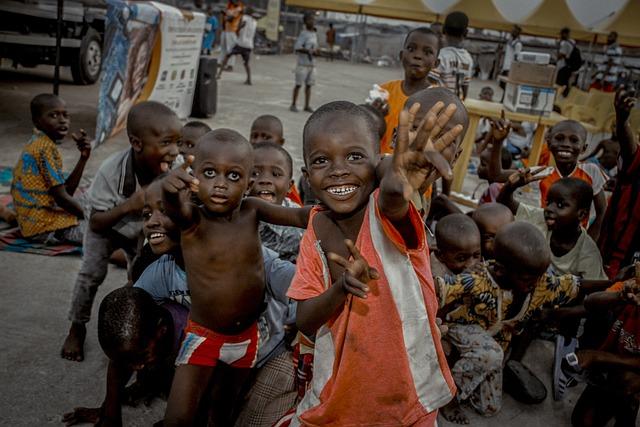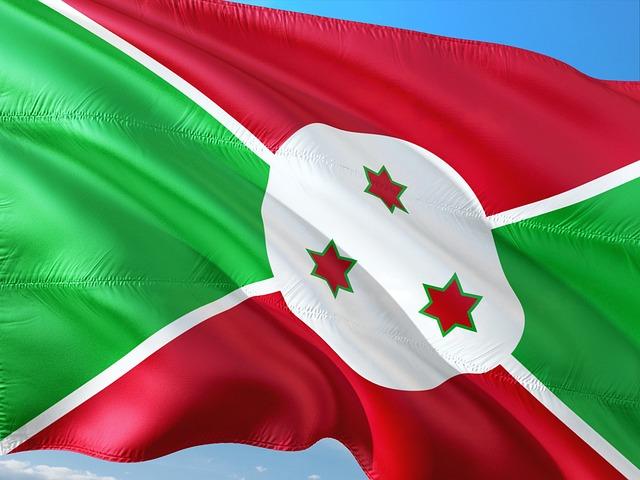In recent years, Burundi has emerged from a tumultuous period marked by political upheaval, civil strife, and international isolation, raising questions about the nature and sincerity of its current diplomatic overtures. The Crisis Group’s latest report, “Burundi: charm Offensive or Real Change?” provides a critical analysis of the country’s recent attempts to rebuild its international relationships and improve its image on the global stage. As the Burundian government endeavors to shift perceptions and attract foreign investment,the potential for genuine reform hangs precariously in the balance. This article delves into the complexities of Burundi’s political landscape,evaluates the effectiveness of its charm offensive,and investigates whether the country’s efforts signify a transformative shift or merely a strategic façade designed to mask deeper systemic issues. As the world watches closely, the stakes for Burundi—and the broader East African region—have never been higher.
Burundi’s Diplomatic Strategies: An Overview of Recent Initiatives
In recent months, Burundi’s government has embarked on a series of diplomatic initiatives aimed at reshaping its international image and fostering stronger bilateral relations. This shift appears motivated by a desire to re-engage with the global community following years of isolation due to political turmoil and human rights concerns. Key strategies include:
- Regional Cooperation: Strengthening ties with neighboring countries through formal agreements and joint initiatives, particularly in trade and security.
- Engagement with International Organizations: Actively participating in forums such as the African Union and the United Nations to advocate for support and investment.
- Outreach to Western Powers: Conducting diplomatic missions to rebuild relations with Western nations, focusing on economic partnerships and political dialog.
These efforts have yielded mixed responses, as analysts debate whether they mark a genuine shift in policy or merely a tactical “charm offensive.” Observers have noted some tangible outcomes, such as increased foreign visits to Burundi and pledges of investment in key sectors like agriculture and infrastructure. To further illustrate the changing landscape, the following table summarizes recent diplomatic visits and agreements:
| Country | Visit Type | Date | Key Agreement |
|---|---|---|---|
| Kenya | Presidential Visit | August 2023 | Joint trade initiative |
| USA | Diplomatic Mission | September 2023 | Potential investment agreements |
| China | Economic Forum | July 2023 | Infrastructure development funding |
Evaluating the Impact of Foreign Aid on Domestic Reforms
The relationship between foreign aid and domestic reforms in Burundi has been a topic of contention and speculation. Proponents argue that aid can catalyze notable improvements in governance, economic stability, and human rights, while skeptics claim it often fosters dependency and hinders actual reform. In the case of Burundi, while international funding brings much-needed resources, its impact on genuine change remains ambiguous. Recent observations suggest that reforms introduced under the aegis of foreign assistance often lack the local ownership necessary for sustainable development. This can lead to a situation where reforms are superficial, designed to appease foreign donors rather than addressing the root problems plaguing the nation.
Moreover, the effectiveness of foreign aid in driving reforms is hindered by a complex political landscape characterized by entwined interests of local power structures. Key factors influencing this dynamic include:
- Government Accountability: Limited political will to implement substantive reforms due to entrenched interests.
- Sectoral Focus: Aid often prioritizes certain sectors like health and infrastructure, overshadowing critical areas such as governance and justice.
- Conditionality of Aid: External pressures for reform frequently enough clash with local priorities,leading to resistance
To understand the extent to which aid can provoke genuine reforms,it is indeed crucial to evaluate specific areas impacted by foreign assistance. The following table summarizes the aids provided in various sectors and their correlating impact on domestic reforms over the past few years:
| Sector | Type of aid | Reported Impact |
|---|---|---|
| Health | Grants | Improved healthcare access, yet mismanagement persists |
| Education | Technical Assistance | Increased enrollment, but quality issues remain |
| Infrastructure | Loans | Enhanced transportation networks, high debt levels |
Human Rights Concerns: ongoing Challenges in Leadership
The recent political landscape in Burundi has been characterized by a façade of diplomatic charm aimed at improving the nation’s international standing. However, beneath these superficial efforts lies a complex web of human rights violations that continue to plague the nation. Notably, reports indicate that instances of arbitrary detentions, political repression, and restrictions on free speech remain rampant. The government has been accused of silencing dissent through intimidation and violence,casting doubts on its commitment to reform. Despite the leadership’s attempts to project a positive image, the reality on the ground has prompted serious concern from human rights organizations and foreign observers alike.
To better understand the ongoing challenges, it’s essential to highlight a few key issues:
- Political Repression: Political opposition is often met with harsh retaliation, stifling any potential for meaningful dialogue.
- Media Censorship: Journalists face threats and censorship, severely limiting press freedom and clarity.
- Displacement of Citizens: Ongoing violence has led to significant internal displacement, forcing many to flee their homes.
Furthermore, aligning with international human rights frameworks remains a sore point. While the leadership expresses a desire for economic cooperation and foreign investment, the absence of accountability measures raises alarms. As illustrated in the table below, the disparity between international expectations and local actions continues to widen:
| Human Rights Aspect | Current Status | International Expectation |
|---|---|---|
| Freedom of Expression | Severely Restricted | Fully Protected |
| Political Participation | Limited to Pro-Government | Inclusive for All |
| Judicial Independence | compromised | Fully Autonomous |
The Role of Civil Society in Shaping Political Discourse
The recent developments in Burundi highlight the significant influence of civil society on political discourse. Civil society organizations (CSOs) have been at the forefront of advocating for democratic reforms and fostering inclusive dialogue among various stakeholders.Their role has been pivotal in bridging the gap between the government and citizens, ensuring that diverse voices are heard.By mobilizing grassroots support and utilizing platforms for advocacy, these entities have transformed how political issues are framed and debated. They emphasize the importance of transparency, accountability, and participatory governance, thereby reshaping public expectations of political leadership.
Moreover, civil society’s engagement extends beyond mere advocacy to include monitoring governmental actions and holding leaders accountable. This is evident through various initiatives aimed at promoting civic education, encouraging voter participation, and fostering dialogue around sensitive topics. Some key contributions of civil society in this context include:
- Organizing community forums for open discussions on governance.
- Conducting research and disseminating findings to inform public debate.
- Facilitating training sessions for young activists to enhance their capacities.
Potential Pathways to Genuine Change and Stability
amid the political turbulence in Burundi, the search for sustainable solutions requires a multi-faceted approach that fosters both trust and long-term stability.Engaging with local communities through inclusive dialogue is essential. This entails:
- Empowering civil society: Invest in grassroots organizations that promote open communication and reconciliation.
- Fostering political inclusivity: Encourage the participation of all political factions in governance to create a representative political landscape.
- International collaboration: Strengthen relationships with regional partners and international bodies to facilitate dialogue and provide necessary support in peacebuilding initiatives.
Moreover, addressing the underlying socio-economic issues can significantly contribute to stability.Essential strategies might include:
- Economic diversification: Develop various sectors beyond agriculture to reduce vulnerability and stimulate job creation.
- Education and training: Invest in educational programs that enhance skills, particularly for the youth to provide them with viable employment opportunities.
- Strengthening governance: Implement systems of transparency and accountability to boost public trust in institutions and government actions.
International community’s Response: Opportunities for Engagement
The international community stands at a critical juncture regarding its engagement with Burundi, where a blend of skepticism and optimism shapes the narrative surrounding the nation’s political landscape. This moment presents various avenues for constructive dialogue and support, which could foster a more stable and democratic surroundings. Opportunities for engagement include:
- Diplomatic Initiatives: Expanding diplomatic ties to encourage governmental transparency and inclusive governance.
- humanitarian Aid: Providing assistance that addresses the immediate needs of the Burundian population while also supporting long-term development goals.
- Partnerships with Civil Society: Collaborating with local NGOs to promote human rights, civic engagement, and participatory governance.
- Capacity Building: Offering training and resources aimed at strengthening local institutions and democratic processes.
additionally, monitoring and evaluation mechanisms will be essential to ensure that engagement efforts yield tangible results. A strategic approach could involve establishing a framework for accountability that benchmarks progress in key areas, such as:
| Area of focus | Key Performance Indicators |
|---|---|
| Political Stability | Reduction in violence and political disputes |
| Human Rights | Improvement in freedom of expression and assembly |
| Economic Growth | Increase in foreign investments and job creation |
| Civic Engagement | Higher voter turnout and participation in local governance |
Wrapping Up
Burundi’s recent diplomatic initiatives reveal a complex interplay between charm and substance, leaving observers to ponder whether these efforts signify a genuine shift in the nation’s political landscape or are merely a façade designed to mend international relations. As the government seeks to enhance its image on the global stage, the legacy of past conflicts and ongoing governance challenges persist, raising critical questions about the sustainability of any perceived reforms.
While there are notable signs of engagement and dialogue, the path ahead remains fraught with skepticism. The realities on the ground, including human rights issues and economic constraints, will ultimately determine whether Burundi’s latest moves represent a meaningful departure from its troubled history or a temporary strategy to secure foreign investment and aid.
As stakeholders monitor the situation, it is indeed essential to remain vigilant, ensuring that any progress is not only celebrated but critically assessed. The future of Burundi hinges not just on its diplomatic overtures but on the tangible improvements in the lives of its citizens—an outcome that remains to be seen. Only time will reveal whether Burundi’s charm offensive translates into lasting change or if it is simply a calculated gesture in a still-fragile political landscape.

